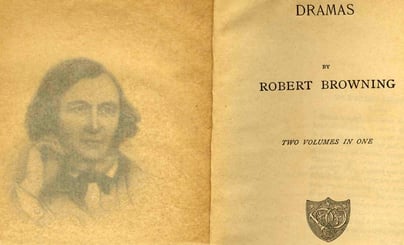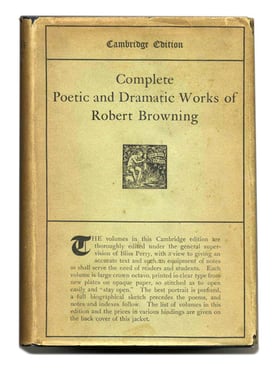Renowned English poet Robert Browning was born in 1812 in the London suburb of Camberwell. Finding school irritating and uninteresting, Browning left formal institutional learning behind and was educated at home by a tutor. He also utilized his father's six thousand volume personal library. By the time he was twelve, he had written his first volume of poetry, though the manuscript does not survive.
The course of Browning's writing career is an interesting one. Initially, his poems and dramatic monologues were well received; Charles Dickens even offered him praise for his monologue, Paracelsus. But, as he continued writing and honing his style, many readers and critics believed his poems were too obscure in reference and illusion. It was not until his collection Men and Women (1855) that he began to see a more positive response to his work. In 1868, he published his long poem comprised of dramatic monologues, The Ring and the Book. This book was critically acclaimed and ushered in a new era of respect and commercial success for Browning. He died in 1889 and is buried in Westminster Abbey in Poet's Corner, near Alfred Lord Tennyson. Here are five interesting facts you might now know about this influential poet.
He Beat the Odds to Marry Elizabeth Barrett Browning
 Robert Browning first began a correspondence with the (more successful and six years older) poet Elizabeth Barrett after being particularly struck by a collection of her poems. The circumstances for a romantic match were not ideal. Barrett was under the thumb of her rather controlling father who disapproved of marriage for her and as well as for all of his children. Nevertheless, Barrett and Browning fell in love, and she left behind her family to marry him. This resulted in her father disowning her.
Robert Browning first began a correspondence with the (more successful and six years older) poet Elizabeth Barrett after being particularly struck by a collection of her poems. The circumstances for a romantic match were not ideal. Barrett was under the thumb of her rather controlling father who disapproved of marriage for her and as well as for all of his children. Nevertheless, Barrett and Browning fell in love, and she left behind her family to marry him. This resulted in her father disowning her.
Browning and Barrett Browning moved to Italy where they lived happily until her death in 1861. They remain one of literature's most famous marriages. It is speculated by some that sympathy for Browning regarding her death resulted in an overall increased interest in his poetry by critics, resulting in the resurgence of his career. Browning never remarried. Their story was made into a play by Rudolph Besier titled The Barretts of Wimpole Street. The play has been twice adapted into film and is the inspiration for a musical titled Robert and Elizabeth.
His "Childe Roland to the Dark Tower Came" Inspired Stephen King
One of Browning's more famous poems is titled “Childe Roland to the Dark Tower Came” which details the knight Roland's journey to the Dark Tower through a barren and desolate plain. It was published in Browning's collection Men and Women and was directly inspired by some of Edgar's lines from Shakespeare's King Lear. Shakespeare was himself inspired by the fairy tale Childe Roland.
Browning's poem is the primary influence of Stephen King's The Dark Tower series. King's famous gunslinger Roland gets his name from the poem and the setting and destination of the Dark Tower also appear in the book, as do the characters of Cuthbert and Giles. While King's series is the most famous work inspired by the poem, it has also inspired numerous other poems, novellas, book series, and even the 20th anniversary special of the British television program Doctor Who.
He Despised Spiritualism
 During Browning's lifetime, spiritualism was hugely popular. While it had many detractors, it had many defenders as well, including Sir Arthur Conan Doyle and Elizabeth Barrett Browning. Robert Browning, however, believed spiritualism to be nothing more than a scam conceived to con grieving people out of their money. A source of constant disagreement for the couple, they agreed to attend a séance held by popular Scottish medium, Daniel Dunglas Home. At the séance, Home produced an apparition which he claimed to be the spirit of the son the Brownings had lost in infancy. However, the Brownings had never lost a son. Angry at the hoax, Browning grabbed the apparition which turned out to simply be Home's bare foot. While everyone at the séance witnessed the hoax and the allegation of fraud was supported by another spiritualism denier, famed magician Harry Houdini, Home's career as a medium carried on. Barrett Browning herself continued to believe in spiritualism, not considering this particular hoax enough to discredit previous paranormal events she had witnessed.
During Browning's lifetime, spiritualism was hugely popular. While it had many detractors, it had many defenders as well, including Sir Arthur Conan Doyle and Elizabeth Barrett Browning. Robert Browning, however, believed spiritualism to be nothing more than a scam conceived to con grieving people out of their money. A source of constant disagreement for the couple, they agreed to attend a séance held by popular Scottish medium, Daniel Dunglas Home. At the séance, Home produced an apparition which he claimed to be the spirit of the son the Brownings had lost in infancy. However, the Brownings had never lost a son. Angry at the hoax, Browning grabbed the apparition which turned out to simply be Home's bare foot. While everyone at the séance witnessed the hoax and the allegation of fraud was supported by another spiritualism denier, famed magician Harry Houdini, Home's career as a medium carried on. Barrett Browning herself continued to believe in spiritualism, not considering this particular hoax enough to discredit previous paranormal events she had witnessed.
His Voice Was One of the First Heard After Death
Browning hated public speaking. While in his lifetime he earned numerous awards, he always turned down opportunities to speak at events or awards ceremonies. And yet, in spite of his fear of public speaking, he is believed to be one of the first famous people to have their recorded voice played after their death. In April of 1889, eight months before his death, Browning went to a gathering at a friend's house where he recorded himself reciting “How They Brought the Good News from Ghent to Aix” on an Edison cylinder phonograph. The recording was played on the one year anniversary of his death. The recording still exists today and can be listened to on the internet. Charmingly, Browning can be heard apologizing for forgetting some of the words to the poem.
He Had a Love/Hate Relationship with Browning Societies
Though it is most often the case that organizations dedicated to the study of the works of a particular author begin appearing only after their death, it wasn't so with Robert Browning. The first Browning Society was founded at Cornell University in 1877, twelve years before Browning's death. The popularity of such societies spread, with similar groups sprouting up in numerous English-speaking countries. The goals of such societies were to formally discuss and write about Browning's work, to stage amateur productions of his plays, and to promote his work by publishing reading guides and inexpensive reprintings of his books. Browning wasn't fond of these societies since they were always founded without his permission and involvement. However, Browning grudgingly acknowledged that the societies' promotion of his works contributed to his popularity.









